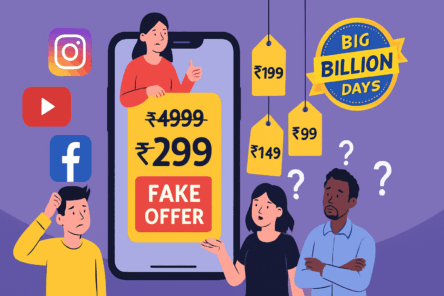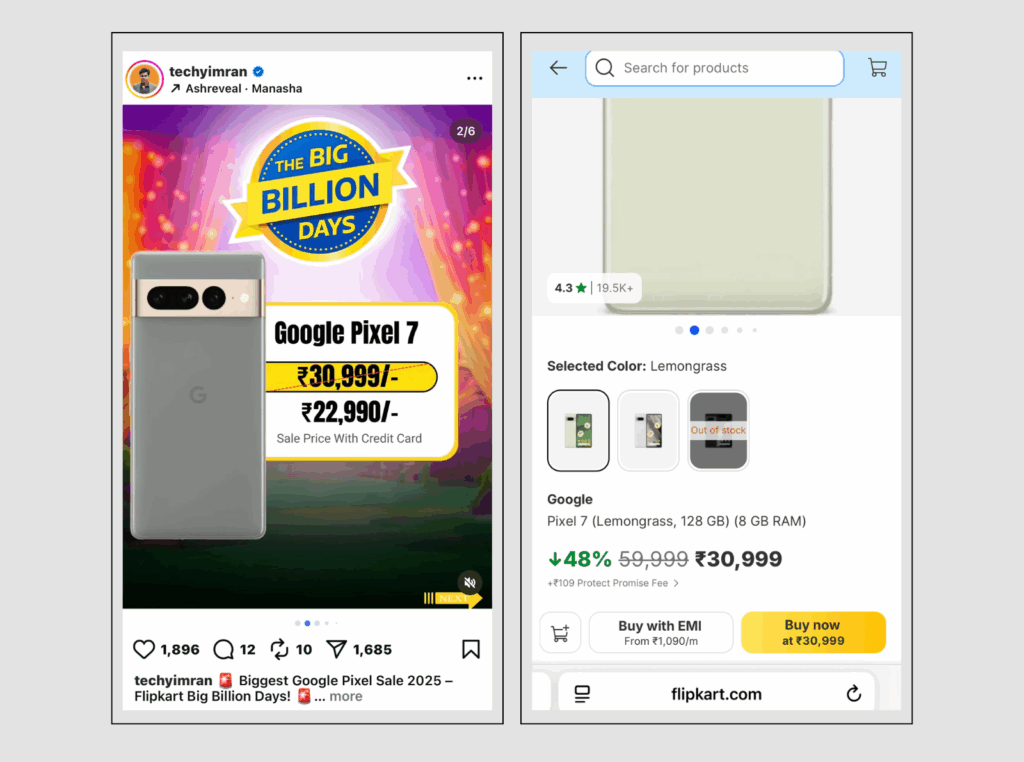
The Rising Hype: Stats and Campaigns
Flipkart’s Big Billion Days reaches nearly 1.4 billion visits during the sale period, making it one of the most influential online shopping events in India. This massive reach is heavily amplified by celebrity and influencer-driven campaigns. In 2025, Flipkart onboarded 11 celebrities and several digital stars to push offers, using Bollywood faces alongside youth-favorite creators for maximum crowd impact.
However, the concern here is that social media influencers are posting prices that are actually incorrect or misleading—intentionally or otherwise. These deceptive posts omit crucial details and terms, focusing solely on reach and engagement. This unethical practice confuses consumers, leading many to pursue offers that do not exist or have hidden conditions. Such misinformation undermines buyer trust and damages the credibility of the sale itself, turning genuine shopping excitement into disappointment.
One such example:

The Reality Behind The Deals: Complaints And Scams
Consumer reports and social media reveal a worrying pattern. Many buyers shared stories of orders canceled last minute or indefinitely delayed. Some claimed Flipkart oversold items like smartphones, including iPhone 16 models, during Big Billion Days with promises of heavy discounts but failed to deliver. One popular Reddit thread gathered hundreds of comments from frustrated users accusing Flipkart of misleading inventory practices and inadequate refunds.
Adding to consumer woes are fake websites and scams exploiting the Big Billion Days brand. Fraudsters create fake Flipkart-like websites advertising unreal discounts, tricking users into sharing personal data or making payments via unofficial channels. Official Flipkart advisories warn users to avoid these, reminding shoppers to use only the genuine Flipkart app or website for purchases.
Why Influencer Marketing Drives Misleading Content
Flipkart’s Big Billion Days depends heavily on influencer-driven promotion for visibility. However, many influencers prioritize reach and engagement over accuracy. They spread “honey trap” prices, which are selectively available or outright false, to create viral buzz. Sponsored or otherwise, these posts often hide terms and conditions that drastically change offer validity. Influencers rarely clarify stock limits, eligibility, or payment terms, leaving buyers misinformed.
This commercial incentive to hype inevitably bypasses consumer protection. While regulators push for clearer sponsorship disclosures and accountability, enforcement remains lax. Influencers benefit financially from high engagement, further incentivizing sensational and misleading posts despite consumer confusion.
The Consumer’s Dilemma: How To Shop Smart
For buyers eager to grab deals, it’s crucial to tread carefully. Verify offers directly on official Flipkart platforms and be suspicious of deals pushed solely through influencer posts. Watch for red flags such as “too good to be true” prices or links directing outside Flipkart’s ecosystem. Always check return policies, payment methods, and sale terms.
Platforms like Flipkart also caution shoppers about phishing scams during Big Billion Days, advising vigilance against fake emails, calls, or messages promising unrealistic prizes or deals. Protect account information—never share OTPs or personal data outside official channels.
Time For Transparency And Accountability
The recurring problem of misleading Big Billion Days offers calls for urgent reforms. Flipkart and its influencer partners must commit to transparent marketing, highlighting exact terms and availability. Regulators should further tighten rules on influencer disclosures and penalize false advertising.
Consumers deserve authentic, fair shopping experiences—not viral sales hype. Until then, awareness is the best defense against being misled by flashy but wrong influencer offers during one of India’s biggest e-commerce events.
